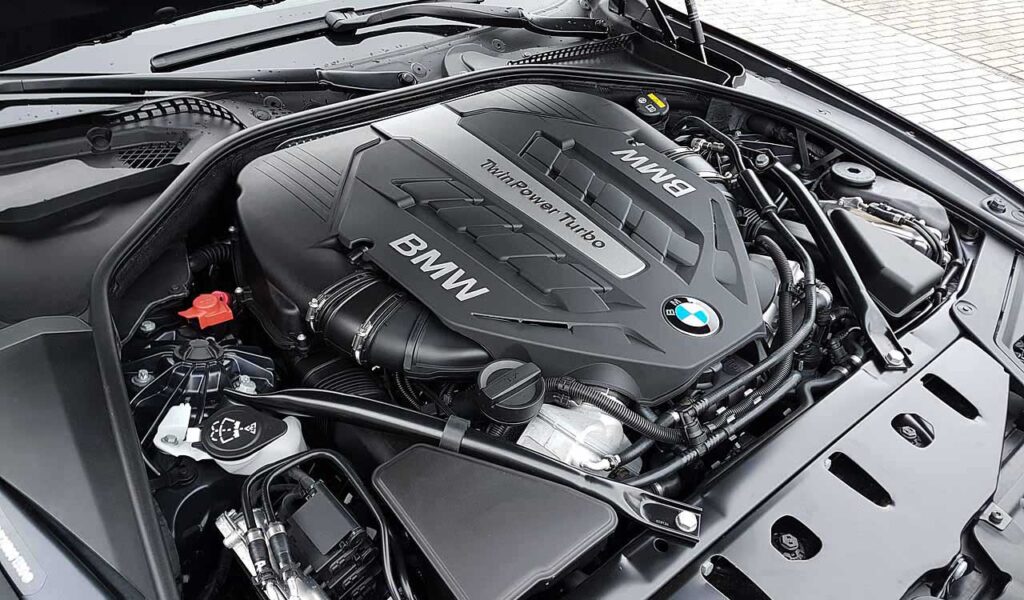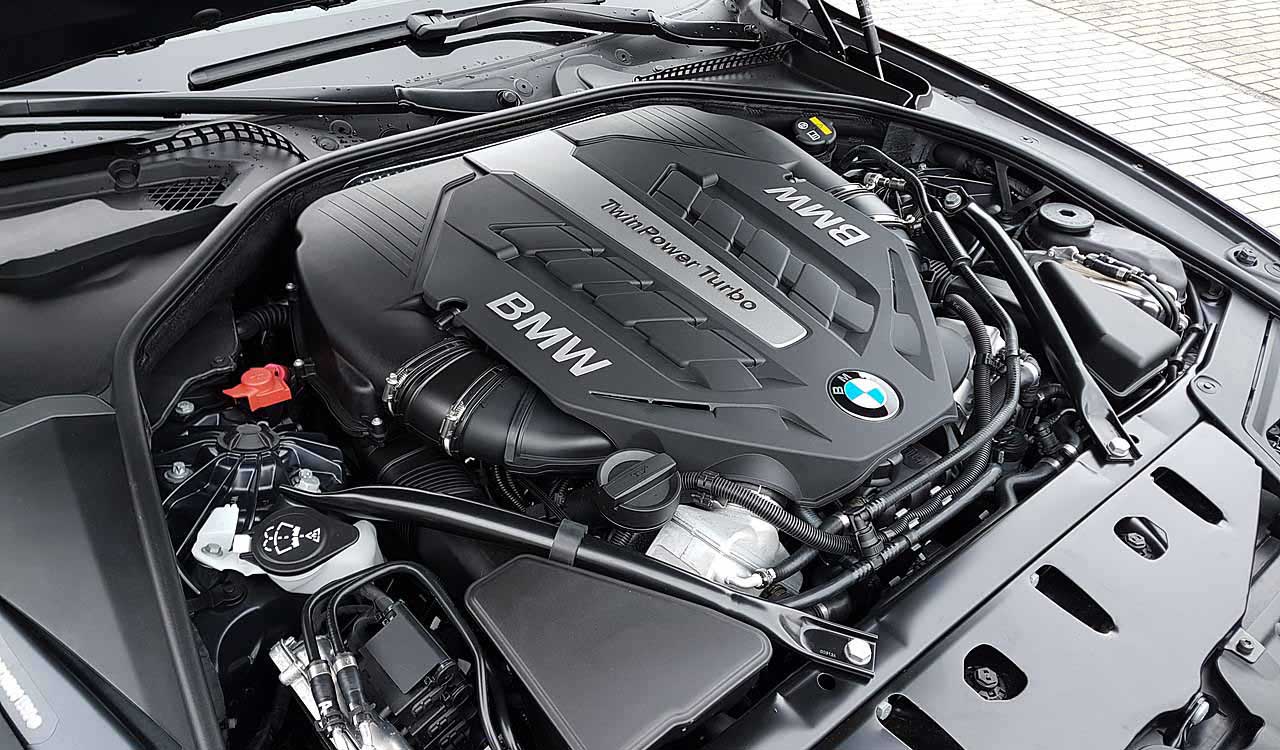The BMW N63TU engine is a highly revised version of the original N63 and was in production from 2013 to 2019. The original N63 suffered had major reliability issues which harmed the reputation of BMW turbo V8s, but the N63TU is almost an entirely different engine. How reliable is the N63TU?
Is the BMW N63TU Reliable?
Yes. The N63TU (N63B44O1) is a reliable engine and far more reliable than the original N63 (N63B44O0). This explains why BMW is still using an even further revised version of it in their G generation of cars. Considering the amount of power they have been designed to output, the N63TU engine is a dependable engine.

While the N63TU does not have the rock-solid reliability of BMW’s naturally-aspirated Inline-6 engines or even the newer turbocharged Inline-6s, its problems are not as widespread as you might think. As with other BMW engines, it still has a couple of design flaws. For example, BMW engines are notorious for their oil leaks, and the cooling system may need a bit of work to replace brittle hoses. Injectors and ignition coils might also require frequent replacement.
However, none of these are major issues, and regular servicing will pick up on them. They certainly aren’t going to be near the level of problems that you would have got with the old BMW N63.
N63 vs. N63TU
The N63 was the successor of the N62 and BMWs first turbocharged V8 engine and the first production V8 to use a “hot-vee” configuration. Other new features this engine uses are direct injection and an air-to-water intercooler. These advancements made the N63 a true powerhouse with lots of torque, minimal turbo lag, and relatively good fuel efficiency compared to other V8s, but it also compromised reliability.
Soon after, BMW revised the engine and introduced the N63TU to try and remedy some of the problems and improve the reliability of the engine. The engine was extensively reworked, here are some of the differences and changes between the N63 and the N63TU:
- Valvetronic was added
- VANOS system was updated
- Forged rods and crankshaft
- Lighter pistons
- Revised turbochargers
- Revised valve stem seals
- Added a secondary coolant pump
- The blow-off valve was removed
- Updated valve cover
- Revised injectors and high-pressure fuel pump
This is only a short list of what was changed between the N63 and the N63TU. Both engines are 4.4L twin-turbo V8s but beyond that, the differences are really extensive.
Common N63TU Engine Problems
None of the issues with the BMW N63TU are particularly major. The engine suffers from common BMW issues such as oil leaks and others more specific to the engine.
1. Oil Leaks
If you have ever owned a BMW engine before, then you will know that they are notorious for oil leaks from deteriorating gaskets. The BMW N63TU suffers from the same problem, and over time various engine gaskets will degrade, harden, and the engine will start leaking oil from the valve cover gasket, oil filter housing gasket, and oil pan, among others.
If you own an aging N63TU, regularly check for oil leaks and address them promptly. Do not let oil leaks get out of control as this can lead to other issues.
How to fix:
Inspect the source of the oil leak if you smell burning oil or if you see oil around the engine bay. The most common oil leak areas in this engine include the valve covers, oil filter housing, upper oil pan, and turbo oil lines.
2. Coolant Consumption
Some BMW N63TU engines burn an unusual amount of coolant and require coolant top-off. The design of the engine, which features a hot-vee configuration, might cause premature degradation of hoses, couplings, and other cooling system components. Expect to have to top up the coolant fairly regularly.
How to fix:
Regularly top off the coolant and inspect the engine bay for possible coolant leaks. Minor coolant leaks will usually look like a white or blueish residue around coolant components. Coolant lines around the “hot-vee” of the N63TU tend to be problematic.
3. Ignition Coil Failure
Unfortunately, premature ignition coil failure is an issue that affects all direct-injected BMW engines. The N63TU is no exception, and ignition coil packs lasting less than 50,000 miles are not out of the norm. Symptoms of a failed ignition coil include misfires on a single cylinder.
How to fix:
Replace ignition coils and spark plugs every 60,000 miles or when you start experiencing misfires.
4. Injector Failure
Premature injector failure is a common problem with the BMW N63TU. Initial symptoms might be subtle. The engine will feel sluggish and lacking power, you’ll see a check engine light, and you’ll have to drive home in limp mode.
A lot of the time the issue is temporarily remedied with an engine restart. However, sooner or later, if you don’t replace the failing injector you may experience misfires, or the engine will fail to start.
How to fix:
Replace all injectors with OEM injectors. Use high-quality fuel.
5. Leaky Valve Stem Seals
Bad valve stem seals and BMW V8s. Name a more iconic duo. The N62 and the N63 suffered from this problem and although BMW reworked the stem seals for the N63TU, the issue wasn’t completely fixed. Note that this issue isn’t as prevalent on the N63TU.
Symptoms of bad valve steam seals include smoke with a hint of blue coming out of the exhaust, excessive oil consumption, and burning oil smell.
How to fix:
Replace valve stem seals. This is a very labor-intensive job so unfortunately most of the time I’ll be more viable to run the engine as is.
5. High Cost of Maintenance
It would be amiss of us if we didn’t point out that the BMW N63TU is a relatively expensive engine to keep well-maintained. This engine offers a lot of performance and a tuned N63TU can be a real monster but the high-performance nature of the engine means you’ll have to spend quite a lot on maintenance, even when compared to other turbo inline-6 engines from BMW.
You can expect to spend ~$3000 annually in maintenance for a 6-year-old N63TU. Do bear in mind that while you are going to be getting a fairly reliable engine with the BMW N63TU, you are certainly going to be paying a lot for maintenance in the form of labor and parts. Learning how to DIY the basics would be excellent.
BMW N63TU long-term longevity
You can expect to get about ~180,000 miles from a stock BMW N63TU. However, this is assuming that you take care of the engine with regular oil changes and warm it up before putting high loads on it. If the check engine light ever comes on, diagnose the issue promptly. A neglected N63TU will end up costing you more than keeping up with regular maintenance.
Sure, the BMW N63TU does have a few issues. This doesn’t stop it from being a reliable engine that can last many miles with regular maintenance.
BMW N63TU reliability when tuned
The BMW N63TU is excellent for tuning. It is an incredibly strong turbocharged engine that can be modded rather easily. The N63TU horsepower and torque can increase significantly with a simple catless downpipe and tune.
Is the N63TU reliability affected when you tune it? Well, yes. Slightly. When you mod an engine, you are pushing it beyond what it was originally designed to do. If you mod the BMW N63TU, then you will notice a small decrease in reliability, but the power gains more than offset that.
That being said, it is only going to be a small decrease. Expect to have to change your spark plugs, and ignition coils more often. This is an exceedingly strong engine, and it almost seems as if it has been built for modding. As you tune the engine properly, then you should be able to get a decent amount of life out of your BMW N63TU even when tuned. Change your oil more frequently and
In Conclusion
You may have heard of the numerous issues with the original N63 engine, and it is fair to say that they did exist. It featured a lot of new tech just like the N54, but this compromised reliability in favor of performance. However, the N63TU was a significant rework of the same engine. Despite the similar engine names, the differences between the N63 and the N63TU are major.
The BMW N63TU is a fairly reliable engine but. While it does have issues similar to other BMW engines, with basic maintenance the N63TU can provide you with many miles of reliable service while also putting a smile on your face when you put the throttle down.

